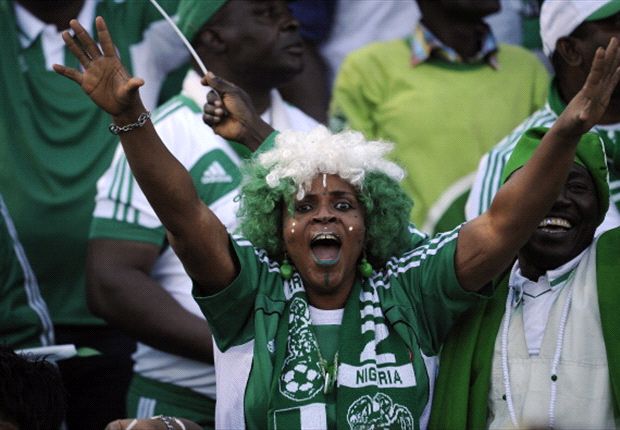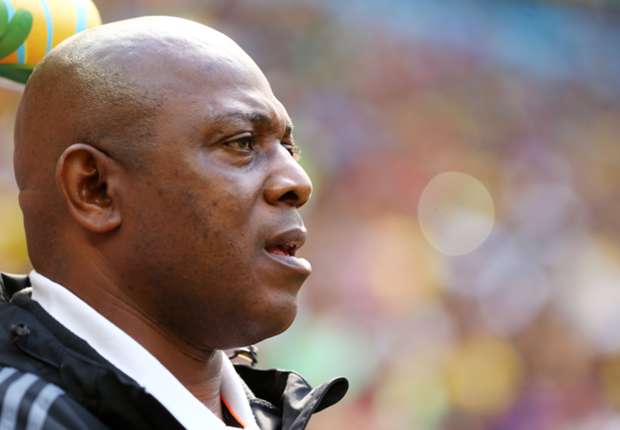The 2014 World Cup has come and gone.
For some, it was an unforgettable tournament, for others it is a tournament best forgotten.
The Germans’ victory highlights the merits of stock taking and proper planning. The revolution of German football after a dismal outing at the 2000 Euro tournament is well-documented, the result of which culminated in their success in Brazil. For Nigeria, while a round-of-16 finish can be seen as an improvement from the last two editions, it is now necessary to take stock, learn lessons and move forward.
For this writer, who considers the Eagles’ elimination in the last 16 a failure, there is much to be learned and much to be improved.
The fact that many celebrate a round-of-16 finish shows how badly the Super Eagles’ stock has fallen and how lowly we rate ourselves. Nigeria’s very first appearance came two decades ago. As debutants, the Eagles made it to the round of 16, as in 2014, but the 1994 class were far more convincing and that maiden appearance still represents Nigeria’s best showing to date.
If, 20 years after, we are still celebrating a round-of-16 showing, it proves we have not made any progress whatsoever.

Nigerians celebrate, but is there any progress?
Senegal got to the quarter-final in their very first and only appearance, Ghana also in only their second appearance and Nigeria, with much more experience in the tournament, is still seeing a round-of-16 finish at her fifth appearance as a good result…it is a big shame.
When we also measure success, we should consider some parameters.
What were the expectations? Did the team surpass expectations?
The answer to these questions is an overwhelming ‘no’!
We all expected the Super Eagles to qualify out of the group considering the luck of the draw and fixtures. Even at that, the Super Eagles struggled and wobbled to qualify and were very lucky. Were it not for some dubious decision-making against Bosnia-Herzegovina in the decisive Group F match, things could have been very different.
In the round-of-16 tie, the French were there for the taking but the naivety of the Super Eagles came into play, hence the 2-0 defeat. In all, Nigeria played four matches, won one, drew one and lost two, how much does that really represent success?
In addition, Nigeria should consider the quality of our football; the Super Eagles did not have any well-defined and obvious approach to their matches.
Their first game against Iran even ranks as one of the worst games of the 2014 World Cup. The Iranians lacked creativity and attacking impetus but a confused Super Eagles did not just know how to react, they wobbled and fumbled for the entire 90 minutes to the boos of a visibly disappointed audience.
The Super Eagles did not look organised in defence. By this; I mean the defensive approach of the team and not necessarily the defenders. The Super Eagles also found it difficult to unlock their opponents and string together four to five passes and there was simply no intelligent play in their approach.

Keshi | Impotent against Iran
While the Class of ‘94 sold Nigerian football to the world and hitherto sold themselves to the world, the 2014 class did nothing to enhance Nigeria’s reputation and help their own careers. Going by their performances at the World Cup, many of the players failed to do their nose-diving careers any good.
It is hard to see the likes of Victor Moses and John Obi Mikel improving their career fortunes with their respective performances. The World Cup is always a good platform for footballers to sell themselves, hence the repertoire of clubs swamping the impressive players. The same can’t be said of the Super Eagles players, apart from one or two pertinent exceptions.
Another cogent point is how the players the Super Eagles players rubbed shoulders with at the age-grade competitions have grown so much in stature and carried their teams.
Seeing how Lionel Messi carried Argentina, it is difficult to know Mikel was the guy that competed for the Golden Ball at the 2005 World Youth Championship.
Similarly, Mario Goetze was at the 2009 U-17 World Cup hosted in Nigeria, while he scored the winning goal at the World Cup. His Nigerian counterparts were nowhere to be found, and we should remember Ramon Azeez won the bronze ball at that tournament.
Toni Kroos was the Golden Ball winner in the 2007 U-17 World Cup that Nigeria won; none of his Nigeria contemporaries comes close today, while he pulled the strings in midfield for the victorious Germans, no Eaglet at that tournament made the Super Eagles 23-man squad. If at this stage, we are still celebrating a round-of-16 finish at the World Cup, then where is the result and gains of our age-grade accolades? We have four titles at U-17 level and can’t get to the quarter-final at the World Cup, how does that add up?
Until we start seeing our 2014 campaign as a failure and access our shortcomings with the hope of addressing them and getting better, we will continue to live in the past and the 1994 tournament will remain as our best.
As long as we continue to celebrate mediocrity, we will continue to languish in mediocrity.
The Germans’ victory highlights the merits of stock taking and proper planning. The revolution of German football after a dismal outing at the 2000 Euro tournament is well-documented, the result of which culminated in their success in Brazil. For Nigeria, while a round-of-16 finish can be seen as an improvement from the last two editions, it is now necessary to take stock, learn lessons and move forward.
For this writer, who considers the Eagles’ elimination in the last 16 a failure, there is much to be learned and much to be improved.
The fact that many celebrate a round-of-16 finish shows how badly the Super Eagles’ stock has fallen and how lowly we rate ourselves. Nigeria’s very first appearance came two decades ago. As debutants, the Eagles made it to the round of 16, as in 2014, but the 1994 class were far more convincing and that maiden appearance still represents Nigeria’s best showing to date.
If, 20 years after, we are still celebrating a round-of-16 showing, it proves we have not made any progress whatsoever.

Nigerians celebrate, but is there any progress?
Senegal got to the quarter-final in their very first and only appearance, Ghana also in only their second appearance and Nigeria, with much more experience in the tournament, is still seeing a round-of-16 finish at her fifth appearance as a good result…it is a big shame.
When we also measure success, we should consider some parameters.
What were the expectations? Did the team surpass expectations?
The answer to these questions is an overwhelming ‘no’!
We all expected the Super Eagles to qualify out of the group considering the luck of the draw and fixtures. Even at that, the Super Eagles struggled and wobbled to qualify and were very lucky. Were it not for some dubious decision-making against Bosnia-Herzegovina in the decisive Group F match, things could have been very different.
In the round-of-16 tie, the French were there for the taking but the naivety of the Super Eagles came into play, hence the 2-0 defeat. In all, Nigeria played four matches, won one, drew one and lost two, how much does that really represent success?
In addition, Nigeria should consider the quality of our football; the Super Eagles did not have any well-defined and obvious approach to their matches.
Their first game against Iran even ranks as one of the worst games of the 2014 World Cup. The Iranians lacked creativity and attacking impetus but a confused Super Eagles did not just know how to react, they wobbled and fumbled for the entire 90 minutes to the boos of a visibly disappointed audience.
The Super Eagles did not look organised in defence. By this; I mean the defensive approach of the team and not necessarily the defenders. The Super Eagles also found it difficult to unlock their opponents and string together four to five passes and there was simply no intelligent play in their approach.

Keshi | Impotent against Iran
While the Class of ‘94 sold Nigerian football to the world and hitherto sold themselves to the world, the 2014 class did nothing to enhance Nigeria’s reputation and help their own careers. Going by their performances at the World Cup, many of the players failed to do their nose-diving careers any good.
It is hard to see the likes of Victor Moses and John Obi Mikel improving their career fortunes with their respective performances. The World Cup is always a good platform for footballers to sell themselves, hence the repertoire of clubs swamping the impressive players. The same can’t be said of the Super Eagles players, apart from one or two pertinent exceptions.
Another cogent point is how the players the Super Eagles players rubbed shoulders with at the age-grade competitions have grown so much in stature and carried their teams.
Seeing how Lionel Messi carried Argentina, it is difficult to know Mikel was the guy that competed for the Golden Ball at the 2005 World Youth Championship.
Similarly, Mario Goetze was at the 2009 U-17 World Cup hosted in Nigeria, while he scored the winning goal at the World Cup. His Nigerian counterparts were nowhere to be found, and we should remember Ramon Azeez won the bronze ball at that tournament.
Toni Kroos was the Golden Ball winner in the 2007 U-17 World Cup that Nigeria won; none of his Nigeria contemporaries comes close today, while he pulled the strings in midfield for the victorious Germans, no Eaglet at that tournament made the Super Eagles 23-man squad. If at this stage, we are still celebrating a round-of-16 finish at the World Cup, then where is the result and gains of our age-grade accolades? We have four titles at U-17 level and can’t get to the quarter-final at the World Cup, how does that add up?
Until we start seeing our 2014 campaign as a failure and access our shortcomings with the hope of addressing them and getting better, we will continue to live in the past and the 1994 tournament will remain as our best.
As long as we continue to celebrate mediocrity, we will continue to languish in mediocrity.
No comments:
Post a Comment